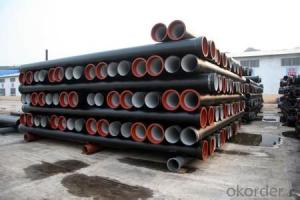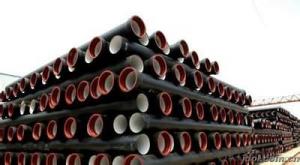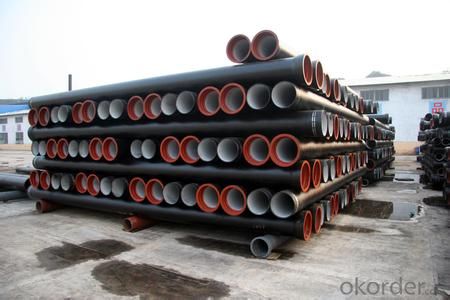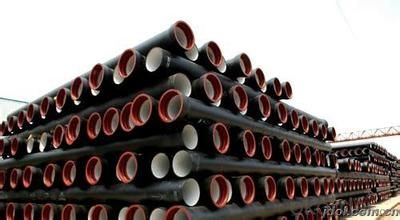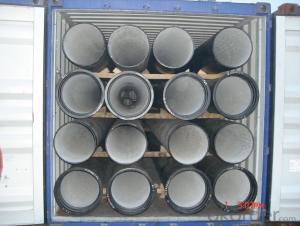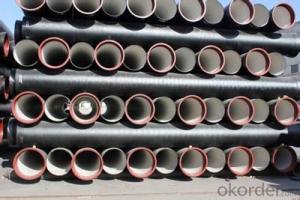DUCTILE IRON PIPE K8 DN300
- Loading Port:
- China Main Port
- Payment Terms:
- TT OR LC
- Min Order Qty:
- -
- Supply Capability:
- -
OKorder Service Pledge
OKorder Financial Service
You Might Also Like
Ductile Iron Cast Pipe is without any defects compare with tradition casting tech, which has many advantages particularly as follow:
(1) High density. In the "vertical upward casting" process, the melt iron of centre liquid column in center crystallizer is continuously feeding for volume shrinkage caused by condensation tube at outer circumference , which lead to be free of shrinkage porosity.
(2) High purity. When melt iron pouring, the mixed impurities such as gas, dross, sand grain which are lighter than melt iron could be eliminated at furnace mouth, its impossible to enter into the crystallizer through the channel, so the melt iron into the crystallizer is very pure.
(3) Strength with toughness. The cooling speed provided by continuous crystallizer is 30 times than sand casting and 5 times than centrifugal casting, and doesn't produce white iron, the eutectic cell volume of continuous cast iron is one eighth to one tenth compare with traditional cast iron. The density of graphite nodule in ductile iron can reach 300-700 pcs/mm2. Therefore, all reason above improve the strength and toughness of continuous cast iron.
(4) Free machining. The high speed cooling make the hardening phase (such as boride, steadite) not appear like reticular, massive or thick, but diffuse like fish bone and pane in shape, moreover, there are tiny graphite flakes inlaid hardening phase. It's free machining in BrinellHardness the range of 250-300HB. However, the Brinell Hardness of 250 is top limit to common metal materials.
(5) Uniform composition of tube wall. The convection mixing of liquid column caused by marching type drawing in crystallizer make the composition of tube wall well-distributed, and concentration gradient very little.
(6) High productivity. To the wall thickness of tube under 10mm, the speed of continuous casting is 1 meter/min, to the wall thickness of tube under 20mm, the speed of continuous casting is 0.5 meter/min, which is high efficiency that centrifugal or other casting tech couldn't reach.
- Q: Can ductile iron pipes be used for underground fuel storage systems?
- Underground fuel storage systems can utilize ductile iron pipes, which offer superior strength, durability, and flexibility compared to traditional cast iron pipes. These properties render ductile iron pipes suitable for a range of applications, including underground fuel storage. An important advantage of ductile iron pipes is their resistance to corrosion, a crucial factor for underground storage systems that may encounter various fuels and chemicals. Furthermore, their high tensile strength and resilience enable them to withstand external pressure and loading, ensuring the integrity and safety of the underground storage system. Additionally, ductile iron pipes boast a long lifespan, typically lasting for several decades. This longevity makes them a cost-effective option for underground fuel storage systems, as they can bear the weight of stored fuel and potential ground movements while maintaining the structural integrity of the system over time. Nevertheless, it is worth noting that the appropriateness of ductile iron pipes for underground fuel storage systems may depend on other factors, such as local regulations, soil conditions, and the specific fuel being stored. To ensure compliance and safety, it is always advisable to seek guidance from professionals and adhere to relevant guidelines when designing and installing such systems.
- Q: Can ductile iron pipes be used for water distribution networks in rural areas?
- Yes, ductile iron pipes can be used for water distribution networks in rural areas. Ductile iron pipes have excellent strength and durability, making them suitable for various applications, including water distribution. They can withstand high pressure, provide a long service life, and have good resistance to corrosion and external stresses. Additionally, ductile iron pipes are relatively cost-effective and require minimal maintenance, making them a reliable choice for water distribution networks in rural areas.
- Q: Can ductile iron pipes be used for irrigation canal lining?
- Yes, ductile iron pipes can be used for irrigation canal lining. Ductile iron pipes are known for their strength, durability, and resistance to corrosion, making them suitable for various applications including irrigation systems. They can withstand the pressure of water flow and provide a reliable and long-lasting solution for canal lining in irrigation projects.
- Q: How does ductile iron pipe perform in high-temperature steam applications?
- In high-temperature steam applications, ductile iron pipe performs admirably. Ductile iron, renowned for its strength and durability, possesses the capability to endure high pressures and temperatures. When subjected to high-temperature steam, ductile iron pipes retain their structural integrity and are not easily deformed or cracked. They possess a remarkable resistance to thermal expansion and contraction, rendering them suitable for situations where temperature fluctuations are common. Furthermore, ductile iron pipes exhibit exceptional corrosion resistance, a crucial characteristic in steam applications where the presence of moisture can accelerate corrosion. All in all, ductile iron pipes are a dependable choice for high-temperature steam applications, delivering enduring performance and ensuring the secure and efficient transportation of steam.
- Q: How are ductile iron pipes tested for quality?
- Various methods are employed to test the quality of ductile iron pipes, ensuring they meet required standards and specifications. One commonly used test is the hydrostatic pressure test, wherein the pipes are subjected to high-pressure water or other liquids to detect leaks or weaknesses. Water is typically used to fill the pipes, with the pressure gradually increased to a predetermined level. This test effectively identifies potential defects that could compromise the pipes' integrity. Another important quality test for ductile iron pipes is the tensile test. This involves pulling a sample of the pipe until it breaks, measuring the applied force and elongation. By doing so, the pipe's tensile strength and ductility can be determined, ensuring it can withstand required loads and stresses without deformation or failure. In addition to these tests, other quality checks include visual inspection, dimensional checks, and surface defect examinations. Visual inspection involves scrutinizing the pipes for visible defects like cracks, voids, or surface irregularities. Dimensional checks ensure the pipes meet specified dimensions and tolerances. Furthermore, ductile iron pipes often undergo corrosion resistance tests. This entails exposing the pipes to corrosive environments such as saltwater or acidic solutions to evaluate their resistance to corrosion. This is vital in determining the pipes' durability and longevity, particularly in harsh conditions. Overall, ductile iron pipes undergo rigorous testing to ensure their quality and performance. These tests guarantee that the pipes meet required standards, are safe for use, and can withstand anticipated loads and environmental conditions in their intended applications.
- Q: What is the expected buoyancy of ductile iron pipes?
- The expected buoyancy of ductile iron pipes can vary depending on several factors such as the diameter, wall thickness, and the specific gravity of the fluid being transported. However, in general, ductile iron pipes are known for their relatively low buoyancy compared to other materials like plastic or concrete. Due to their higher density and weight, ductile iron pipes tend to have a greater resistance to buoyancy forces. This makes them suitable for applications where buoyancy is a concern, such as water and wastewater transmission systems. The combination of their inherent strength and weight helps to keep the pipes grounded and prevents them from floating or rising to the surface. It is important to note that even though ductile iron pipes have lower buoyancy compared to other materials, they may still experience some level of buoyancy in certain scenarios, especially when the fluid being transported has a lower specific gravity. To mitigate this potential issue, additional measures such as anchoring or ballasting may be employed to ensure the stability and integrity of the pipeline system. Overall, while the expected buoyancy of ductile iron pipes is generally low, it is crucial to consider the specific conditions and requirements of the project to determine the most appropriate pipe material and design for optimal performance and safety.
- Q: How are ductile iron pipes different from PVC pipes?
- Ductile iron pipes are made from a type of iron that has a higher strength and durability compared to PVC pipes, which are made from a type of plastic. Ductile iron pipes are more suitable for high-pressure and underground applications due to their superior strength, while PVC pipes are commonly used for low-pressure and aboveground applications. Additionally, ductile iron pipes have a longer lifespan and can withstand higher temperatures, making them more suitable for a wide range of environments.
- Q: Are ductile iron pipes suitable for underground parking structures?
- Yes, ductile iron pipes are suitable for underground parking structures. Ductile iron pipes are known for their strength and durability, making them an ideal choice for underground applications where they may be subjected to heavy loads or potential impacts. Additionally, ductile iron pipes have excellent corrosion resistance, which is crucial in underground environments where they may be exposed to moisture and other corrosive elements. The high tensile strength and flexibility of ductile iron pipes also allow them to withstand ground movements and settle without cracking or breaking, further enhancing their suitability for underground parking structures. Overall, ductile iron pipes provide a reliable and long-lasting solution for the drainage and water supply needs of underground parking facilities.
- Q: How are ductile iron pipes protected against stray current corrosion?
- Ductile iron pipes are protected against stray current corrosion through the implementation of various measures. One common method is the installation of a protective coating, such as an epoxy or zinc coating, on the external surface of the pipes. This coating acts as a barrier, preventing direct contact between the pipe and the surrounding soil or water. Additionally, cathodic protection systems, such as impressed current or sacrificial anode systems, can be employed to further protect the pipes. These systems help to control and redirect stray currents, minimizing their impact on the ductile iron pipes and preventing corrosion.
- Q: Can ductile iron pipes be used for underground cooling water systems?
- Yes, ductile iron pipes can be used for underground cooling water systems. Ductile iron is known for its strength, durability, and corrosion resistance, making it suitable for various applications, including underground installations. It can withstand the pressure and temperature requirements of cooling water systems, providing a reliable and long-lasting solution.
Send your message to us
DUCTILE IRON PIPE K8 DN300
- Loading Port:
- China Main Port
- Payment Terms:
- TT OR LC
- Min Order Qty:
- -
- Supply Capability:
- -
OKorder Service Pledge
OKorder Financial Service
Similar products
Hot products
Hot Searches
Related keywords
